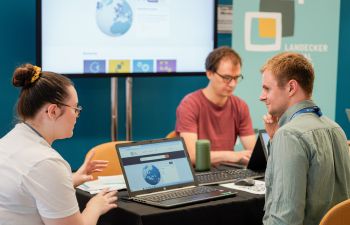Academic team stages first event focused on global approaches to sustaining Holocaust memory in the digital age
Posted on behalf of: Landecker Digital Memory Lab
Last updated: Thursday, 11 September 2025

This Summer, delegates from more than 30 countries came together in a world-first event to shatter disciplinary silos, spark new collaborations, exchange best practice and co-create digital Holocaust memory futures.
The three-day Connective Holocaust Commemoration Expo 2025 was hosted by the Landecker Digital Memory Lab at the University of Sussex, UK. The Lab, launched last year, is funded by the Alfred Landecker Foundation in Berlin. It serves as an international research hub aiming to ensure a sustainable future for Holocaust memory in the digital age.
The event was timely, against a backdrop of severely dwindling numbers of Holocaust survivors, the 80th anniversary year of the end of World War Two and the liberation of many concentration camps, and at a time of increasing politicisation of the Holocaust.
The Connective Holocaust Commemoration Expo 2025 explored innovations that use extended reality (XR), Artificial Intelligence (AI), social media, apps, computer games and immersive film, among others, in the context of memory and education of the Holocaust, through a wide range of both academic and interactive, hands-on sessions.
As well as conventional keynote speeches, panels and roundtable discussions, there was a games arcade, exhibition hall, VR booths, demos of trailblazing digital Holocaust memory projects, networking sessions and a ‘hack’ event which matched digital design creatives with heritage professionals to nurture new collaborations to take projects to the next stage. Watch video recordings of some of the plenaries, keynotes and roundtables.
The Expo’s two keynote speeches were delivered by Paul FMJ Verschure (SPECS Lab, Alicante Institute of Neuroscience, Universidad Miguel Hernandez de Elche and the Future Memory Foundation) on ‘Attempts to Shape the Future Memory of the Holocaust and Nazi Crimes’ and Eva Pfanzelter (University of Innsbruck) on ‘Pixels and Hashtags of the Past: The Holocaust in the Digital Age’.
Plenary discussions focused on the ‘playability’ of the Holocaust in computer games, and the future of Holocaust memory on social media.
Demos included the Holocaust Museum inside computer game Fortnite and an exhibition of the progression of digital projects from the Anne Frank House from one of the first Holocaust-related CD-Roms played on a 1990s Macintosh computer to current-day web and VR-based initiatives. ‘The Future of Holocaust Memory Through Immersive Technology’ masterclass used 3D film including survivor testimony as a springboard for discussion and was hosted by East City Films, who also screened their three VR films from the Journey Back Exhibition at Illinois Holocaust Museum and Education Center.
Other sessions included:
- The Wiener Library, London, showcased ‘Lessons Learned from Building a Digital Library and Archive’
- The Verbrannte Orte project, Germany, presented their linked open data project
- Leo Baeck Institute (Jerusalem and London) and Queen Mary, University of London exhibited their Library of Lost Books initiative which uses crowdsourcing techniques
- A workshop from Osnabrück University, Germany, with the Historical Workshop in Minsk, on low-tech participatory approaches to documenting Holocaust and conflict sites.
The Expo also saw the launch of Digital Memory Dialogues and the beta launch of the Digital Memory Database, groundbreaking resources developed by the Landecker Digital Memory Lab.
Digital Memory Dialogues: an innovative online publishing platform providing a forum for online discussions - and dissent - on a range of digital Holocaust memory topics, in which academics, games designers, digital professionals and heritage experts respond to an academic provocation on a variety of themes including computer games and Artificial Intelligence. The launch was marked at the Expo with a hybrid live/online debate on Dialogues I: ‘Can the Holocaust be made Playable in Computer Games?’.
Digital Memory Database beta launch: a world-first intervention – a database of digital Holocaust memory projects from 1990s to now, including archived demonstrations of projects, complemented by interviews with those involved in creating and enabling them, from programmers to curators. The Lab team gathered valuable user feedback to support further development of the platform, designed to support best practice and research in the field.
Lena Altman, Co-CEO of the Alfred Landecker Foundation said: “As digital technologies redefine how we engage with history, the Connective Holocaust Commemoration Expo demonstrates how remembrance can be made more resilient, more global, and more impactful. This is not just an exhibition – it is a live testing ground for the future of Holocaust education. These hands-on tools don’t replace memory – they re-anchor it where it risks being lost: in younger generations, digital spaces, and societies far removed from Europe’s history. We are proud to support the Landecker Digital Memory Lab in bringing these approaches together – because memory must not only be preserved, but made unmissable and usable in the world we live in now.”
Prof. Victoria Grace Richardson-Walden, Director of the Landecker Digital Memory Lab said: “Increasingly the Holocaust is being politicised. The need to enhance the visibility of nuanced, truthful but engaging presentations of this past to keep it relevant and to resist distortion has never been more urgent. Currently, the digital Holocaust memoryscape is scattered, efforts are duplicated and resources not maintained. The Expo offered a unique opportunity to bring all the actors in this field together, from across the globe, across disciplines and sectors, to share what we’re working on and to move towards a more connective future.”
The Connective Holocaust Commemoration Expo 2025 was the first in a series of three. The next Expos take place in Germany in 2027 and Serbia 2029.
Further information: https://www.digitalmemorylab.com/events/

